This post may contain affiliate links. Please see our disclosure policy for more details.
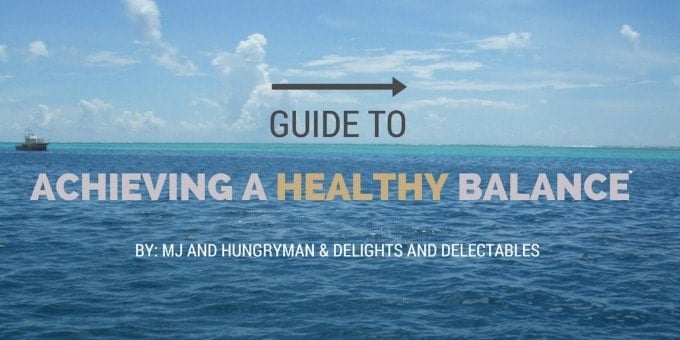
What do you normally reach for when you are feeling stressed out, tired, depressed, bored or even when you’re happy? Umm..chocolate, brownies, cookies, ice cream, anyone?
What do these things all have in common? Sugar in all its highly processed glory. It is the ingredient that turns not so tasty “foods” into highly palatable products.
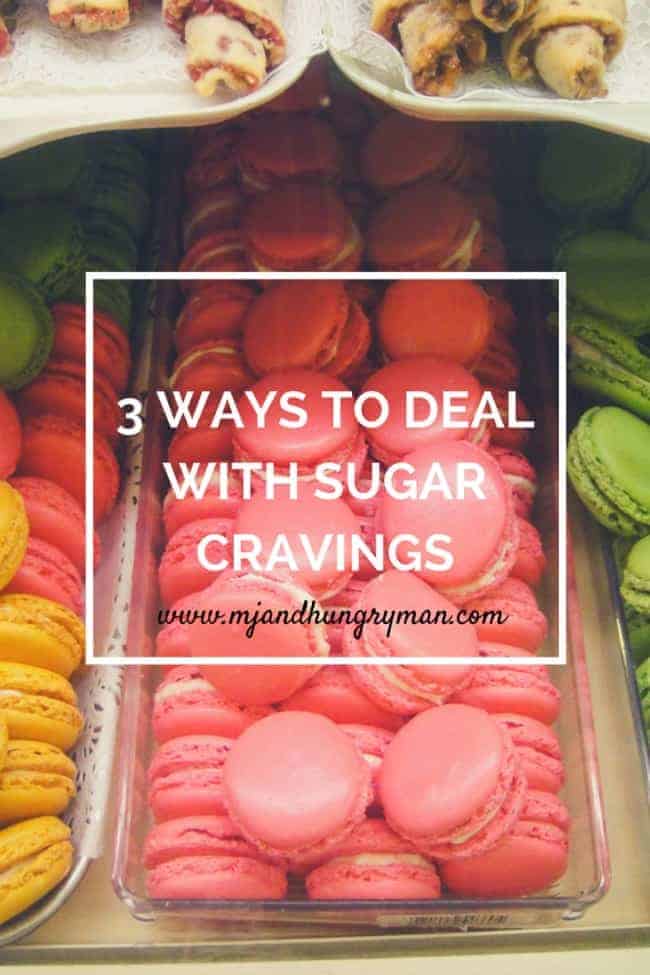
As I mentioned in an earlier post I wrote in regards to the development of childhood food preferences, we have an innate preference for sweet things. It’s pretty hard not to like sugary foods. Now, I’m not saying that you shouldn’t have any sweets period, but that you shouldn’t make it a part of your daily routine. I’ll get into this a bit more towards the end.
Right now, I want to spend some time talking about how chronic, overconsumption of sugar contributes to hormonal imbalance.
The effect of sugar on hormonal balance
Dopamine
The consumption of refined, sugary foods has been shown to increase the release of dopamine, which is both a hormone and neurotransmitter. It activates the nucleus accumbens regions of the brain, which is a part of the “rewards system” or the “pleasure center” (Source). It is the same part of the brain that gets stimulated in individuals with drug addictions. In other words, the more sugar you eat, the more addicted or dependent you may become. That’s great news for many food companies, but not so good for us, the consumers. No wonder they put sugar into EVERYTHING.
Insulin
I’m sure you’ve all heard of insulin. It’s a hormone that allows for sugar (glucose) to get into your cells to be used for energy or stored for later. It basically helps your body maintain a sugar balance so that it’s neither too high nor too low. However, when you eat too much sugar, you can, over time, develop insulin resistance (type 2 diabetes). When this happens, sugar simply builds up in your bloodstream, and this is BAD news if prolonged! It can damage the vessels that supply blood to vital organs and can lead to the development of cardiovascular disease, nerve degeneration, kidney disease, eye disease, etc. In very serious cases, the body will start breaking down fat for energy, producing waste products called ketones, which can lead to a life-threatening condition called diabetic ketoacidosis.
Leptin and Ghrelin
Chronic elevation of insulin also leads to an increased release of another hormone called leptin, aka “satiety hormone.” Leptin is a hormone that’s secreted by our fat cells (adipocytes), and it works together with another hormone called ghrelin, or “hunger hormone,” to regulate energy balance. Simply put, when you eat, leptin is released, sending signals to our brain saying “hey, you’ve had enough food to support your bodily needs so you can stop eating now.” At the same time, ghrelin is suppressed and vice versa. When you haven’t eaten in a while, ghrelin is kicked into gear while leptin is suppressed. In this way, hormones regulate hunger.
However, just like with insulin, continuous consumption of sugar can lead to leptin resistance, in which your brain no longer becomes sensitive to its signals. The result? Insatiable hunger.
So the question now is – How you can “Achieve a Healthy Balance” living in a world where escaping sugar is nearly impossible?
First, it’s important to recognize…
The two different types of sugars:
1) Nutritive sweeteners: these can also be referred to as sugar, added sugar, or caloric sweeteners. Just as the name suggests, they contain an important source of energy, carbohydrates.
They are found in:
- Fruits, vegetables, dairy products
- Added sugars in refined, highly processed foods – these provide “empty” calories. They might as well be considered “negative” calories. While they provide little to no nutrients other than calories, they are sucking all the vital nutrients and minerals from your body. Why? Because the metabolism of carbohydrates into sugar (glucose) requires a number of essential nutrients, including B vitamins, magnesium, copper, zinc, and phosphorous (source).
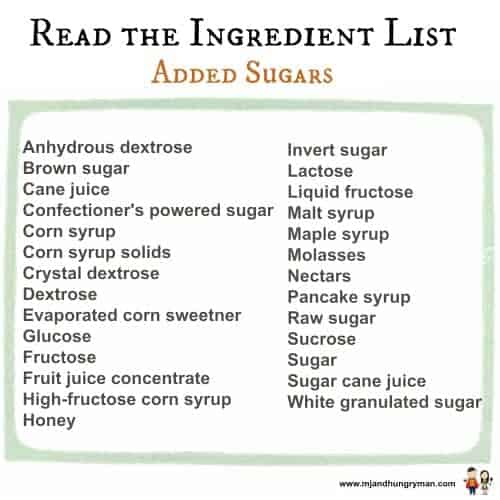 Note: While agave nectar, molasses, honey, and turbinado sugar are perceived as being healthier than the others because they are more natural than table sugar, nutritionally speaking, they all turn into glucose in the end, providing the same amount of calories.
Note: While agave nectar, molasses, honey, and turbinado sugar are perceived as being healthier than the others because they are more natural than table sugar, nutritionally speaking, they all turn into glucose in the end, providing the same amount of calories.
Let’s elaborate a little bit on honey because this is the one my clients ask me about all the time. Yes, research is out there that shows the health benefits of honey – cardioprotective, antioxidant, anti-inflammatory, hypoglycemic, antimicrobial properties, and so on (source). However, you have to realize that you’d have to consume at least 3-5 tablespoons/day to reap those benefits (source). I think it’s safe to say…that’s a whole lotta honey. I personally choose honey over table sugar for its taste and because it’s less refined, not for its health benefits.
The Bottomline: Although some types of sugar are less processed than others, they are still ADDED sugar and thus should be used in moderation. Satisfy your sweet tooth with sugar from whole foods rather than ADDED sugars.
2) Non-nutritive sweeteners: referred to as low-calorie or artificial.
They provide little to no energy. They are much sweeter than sugar, so a little goes a long way.
- Aspartame (Equal), Acesulfame-K, Saccharin (Sweet’N Low), Sucralose (Splenda), Sugar alcohol (those ending with -ol: sorbitol, xylitol, mannitol, etc)
While they are generally recognized as safe (GRAS), if you want my opinion, I stay away from this stuff as much as I can. As I’ve mentioned before, I’d rather eat real, whole foods instead of something with the word “artificial” in it. Not to mention, I can’t stand the terrible aftertaste.
Also, be aware of labels that say “sugar-free.” How can the smoothie, granola bar, or cereal that you’re enjoying taste sweet if it contains no sugar? My fellow registered dietitian, Lindsay, wrote a comprehensive post on why you shouldn’t be fooled by the sugar-free label, so be sure to check it out!
So here are the main takeaways:
- Eat whole foods. Most of the time. When you eat fruits and vegetables, like sweet potatoes and carrots, not only are you getting sugar but also some fiber and protein as well. The combination of these nutrients will help prevent the spike in your blood sugar level and will keep you fuller and more satisfied than a piece of candy would.
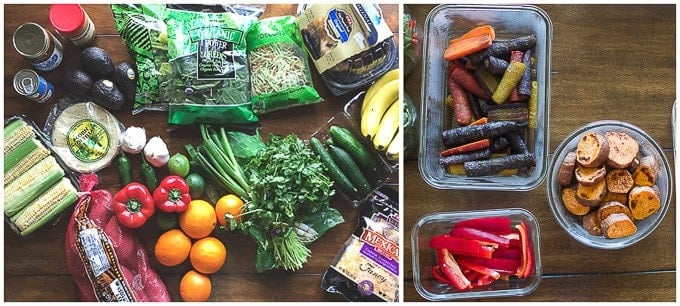
// Meal prep in advance so that it’s just as easy to reach for wholesome foods as it is to open up a box of cookies. Check out my Meal Prep Friday series for some inspiration.
- Don’t be fooled. While packaging labels that say low-sugar, sugar-free, fat-free, low-calorie, etc. can sound quite tempting, be aware as they are FILLED with artificial ingredients. How else are the manufacturers going to make the food taste good? Low-sugar or sugar-free products DO contain SUGAR. “Fat-free” products basically means they’re chock-full of SUGAR. In case you missed it, click here to find out why fats are so important for our health and why you should stop labeling them as “good” or “bad.” As you can see, I am anti-labeling.
- Never say never. Don’t deprive yourself. Instead, honor your cravings and eat mindfully. If you want some ice cream, have some and enjoy every spoonful of it. As soon as you label food as being “off-limits,” what happens? You start craving/obsessing over it, which could lead to you reaching for the inferior sugar-free or fat-free options (yuck!). Because it’s not as satisfying, you may end up consuming more calories than if you just eaten the REAL stuff. Perhaps it may even lead you to binge out of guilt due to the fact that you “blew it.” It’s a vicious cycle, and trust me…I’ve been there and done that. Have that sweet indulgence you love so much, and again, ENJOY it. There’s no room for guilt here. Just don’t make it a part of your daily routine.

// This girl LOVES cinnamon-flavored ice cream (from my recent San Diego trip)

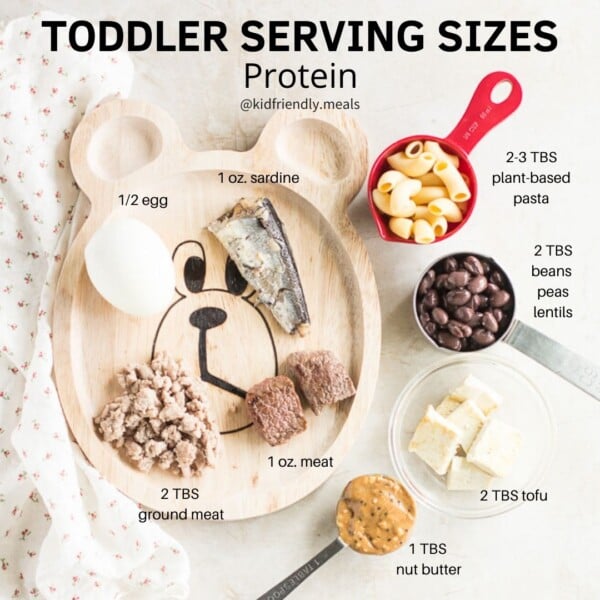
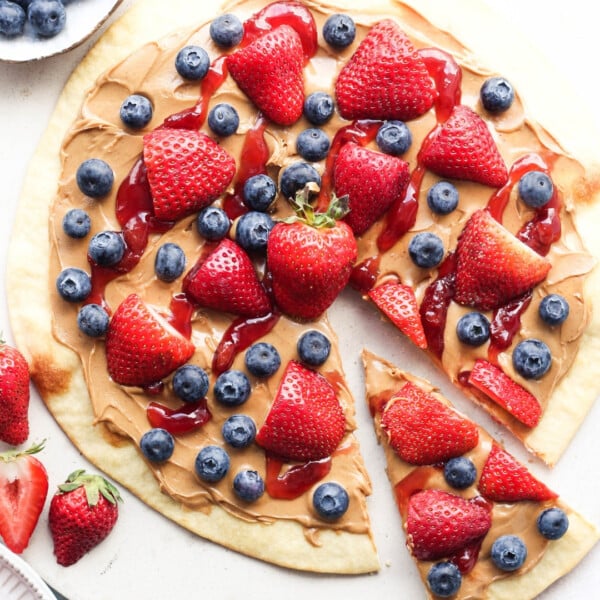











Whooaaaa….great post, Unnie! I try to honor my sweet cravings and sometimes I do it more than I should. But I feel like I have the most satisfying balance with that nowadays, which is extremely relieving because I couldn’t do that years ago. Yay!!! Haha
These are great tips, especially when you mention how to honor the cravings and eat mindfully. Thank you for sharing! 🙂
I love everything about this post! So well written. It drives me crazy when people say something is healthier or call it sugar free because it’s made with honey or maple syrup or coconut sugar, etc., when really it all turns into glucose in the end anyway. I also love the “never say never.” It’s so important not to deprive yourself. Again, fantastic article!
Thank you for sharing this post! I absolutley love nutrition articles and I get all excited when i read them! I am gonna share this article with my parents and family! 🙂